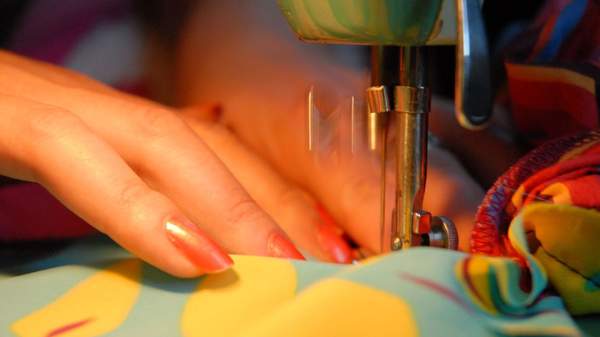Overview
It's no secret that times are tough for the Australian textiles and manufacturing industry. Sadly, over the past decade or so, many local makers (often family businesses who have been in the industry for generations) have been forced to close up shop due to the increasing ease and cost effectiveness of offshore production. For those wonderful Australian designers passionate about supporting what is a rapidly declining local industry and community, it has become near impossible to continue to produce within this country.
While a lower price point and greater accessibility to a revolving door of trends may seem attractive, it's important that as conscious consumers, we have an understanding of the negative environmental and social implications that are inextricably associated with offshore production. More importantly, we must have an appreciation for the incredible amount of time, love, energy and money that goes into producing within Australia as a result of our diminishing industry.
Now more than ever is the time to support the network of extremely talented local designers who are doing their darndest to preserve the integrity and quality of the local industry. To further understand what it means to make within Australia, we spoke to some local designers about why it is so important to them.
Kuwaii
Kuwaii is well-known and loved for producing impeccably constructed garments, as well as nailing the near impossible balance between shoes that are more comfortable than slippers and totally appropriate for grown-up occasions. Designer Kristy Barber's ability to find a harmonious balance between intricate details and beautiful form is undoubtedly thanks in large part to Kuwaii's strong local base.
Kuwaii on local industry: "It's important to preserve the knowledge and skillset of local artists and craftspeople. The more we manufacture off-shore, the quicker this will die out. Also, we believe shipping items across the world is a ridiculous concept and bad for the environment!"
Dress Up
Working out of a quiet little studio in the creative oasis of Collingwood on Melbourne's north-side, Stephanie Downey crafts impeccably tailored womenswear for a loyal audience of thoughtful consumers. Cutting her own patterns and consistently developing wardrobes' worth of instant classics, Downey credits the connection with her local makers, combined with the almost tangible levels of love she injects into Dress Up and the implicit trust and dedication she shares with her wearers.
Dress Up on local industry: "I love being able to have close relationships with my makers — I've learned so much from them. They can see first-hand the love I put into my designs, and consequently they really care about the quality they provide. I think that my customer appreciates that integrity, and the story behind their purchase. We all celebrate local independent fashion brands, but it would be impossible for them to exist without the option to make in Australia."
PER-TIM
The lovechild of dream-team babes Bernadette Francis and Laura Albee Barton, Per-Tim hasn’t even released their first collection and are already attracting all the right kinds of attention for their considerate take on design and creative relationships. Approaching each collection as a project, Francis and Barton not only consider supporting local industry to be an integral aspect of their brand philosophy but also the ongoing collaboration with a range of different practitioners across a variety of creative fields. Their first collection, Club Bed, sits snugly within a gap in the market for innovative loungewear and bedding.
PER-TIM on local industry: "It's very important for Per-Tim to oversee all manufacturing processes, to know that each item is made by hands that have been given a fair wage and to ensure that we are making product in a sustainable manner. Additionally, it is of great concern to us that our production industry is slowly dying, especially here in Melbourne, and we want to do all we can to maintain the many skilled workers and suppliers who are running out of work here as relatively lower costs continue to attract small labels to produce offshore."
Kinoak
Amie and Max Kohane's label Kinoak is like a stone to the heart for lovers of super steezey styles at the intersection of cool and kawaii. A perfect combination of high-quality casual wear, innovative silhouettes and references to a Japanese aesthetic, Kinoak hails FREE TIME (the name of their latest collection) as the Holy Grail. Having worked in the fashion industry for many years (namely, as production manager for P.A.M), Amie formed good working relationships with manufacturers and since starting her own label in 2011, has seen first-hand the rapid degradation of the industry.
Kinoak on local industry: "If we can support what is left of the local manufacturing industry, we will always have creative, sustainable and independent fashion in Australia."
Garth Cook
Even before launching his label in 2009, Garth Cook believed in manufacturing locally in his hometown of Perth, or within Australia. Doing everything from the designing, fabric selection, pattern cutting and toiling for each collection, Cook works with one talented machinist who completes the sampling and production for each season. Finding strength in precise lines and celebrating the female form, it's clear that Cook's work is made with loving hands.
Garth Cook on local industry: "I know that it would be much cheaper for my brand to produce in Bali, India or China but I know that I would not be able to meet the minimum order requirements. More importantly I would miss out of the consultation, advice, quality and genuine care that I receive from my one and only machinist.
I know that we have a lot of talented pattern cutters, machinists and production facilities in Australia. I think it would benefit our micro industry immensely if larger fashion business produced here. But it also comes down to designers and retailers educating their clients about where and how fashion is made. Unfortunately most people don't think about the environmental impact of fast fashion and the conditions in which it is made."
